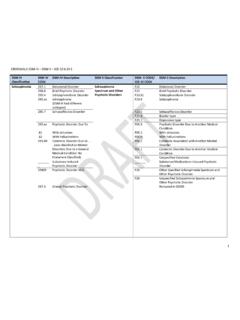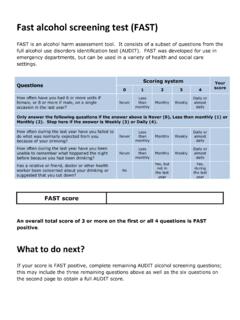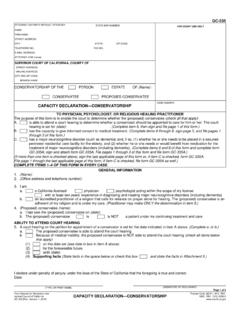Attachment disorders
Found 5 free book(s)CROSSWALK DSM-IV – DSM V – ICD-10 6.29
dhcfp.nv.govDisorders Due to a General Medical Condition No Elsewhere Classified) F06.1 . Catatonia Associated with Another Mental ; ... Reactive Attachment Disorder . Trauma- and . Stressor-Related . Disorders . F94.1 . F94.2 . Reactive Attachment Disorder . Disinhibited Social Engagement Disorder .
VOCATIONAL REHABILITATION WHAT WORKS, FOR …
assets.publishing.service.gov.ukcommon musculoskeletal disorders. Various medical and psychological treatments for anxiety and depression can improve symptoms and quality of life, but there is limited evidence that they improve work outcomes. There is a lack of scientiic clarity about ‘stress’, and little or no evidence on efective interventions for work outcomes.
Fast alcohol screening test (FAST) - GOV.UK
assets.publishing.service.gov.ukFast alcohol screening test (FAST) FAST is an alcohol harm assessment tool. It consists of a subset of questions from the full alcohol use disorders identification test (AUDIT).
GC-335 Capacity Declaration—Conservatorship
www.courts.ca.govtreatment of major neurocognitive disorders (including dementia). (Complete items 6 and 8 of this form and complete form GC-335A; sign and attach form GC-335A. File pages 1 through 3 of this form and file form GC-335A.) (If more than one item is checked above, sign the last applicable page of this form or, if item C is checked, form GC-335A.
The Developmental Implications of Parentification: Effects ...
www.tc.columbia.eduand adult attachment issues (Barnett & Parker, 1998; Earley & Cushway, 2002; Macfie, McElwain, et al., 2005). In each of these cases, the child is more likely to take on the parental role, voluntarily or involuntarily and to varying degrees, in order to compensate for parental deficits and to allow the family to function as a whole.




